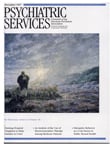Clozapine was introduced into the U.S. market in 1990 as a novel atypical antipsychotic drug. Before that, the last atypical antipsychotic drug approved by the Food and Drug Administration (FDA) was loxapine, way back in 1975. Since 1990 three more atypical antipsychotics have been introduced—risperidone in 1994, olanzapine in 1996, and quetiapine in 1997. As of April 1998 one more, ziprasidone, is under FDA review. Still more are in various stages of development. The promise of atypical antipsychotic drugs is that they have minimal or no extrapyramidal side effects, effectively treat negative symptoms, do not elevate serum prolactin in long-term administration (except for risperidone), and have enhanced efficacy for treatment-refractory schizophrenia (proven only in clozapine use).
In this era of using atypical antipsychotic drugs for treating schizophrenia, we cannot say a requiem for typical antipsychotic drugs such as chlorpromazine and haloperidol the way pharmacology textbooks have done for barbiturates, by describing them in small print. Decompensated schizophrenic patients treated with atypical antipsychotics are still hospitalized because of medication noncompliance. They may still need typical antipsychotic drugs.
They may also benefit greatly from long-acting, depot preparations, currently available in the U.S. for only two typical antipsychotics in three formulations— haloperidol decanoate and fluphenazine decanoate and enanthate. Ironically, both haloperidol and fluphenazine are high-potency neuroleptics, notoriously more likely to cause extrapyramidal syndromes than are low-potency neuroleptics. Long-acting forms of the atypical antipsychotics are not available in the U.S.
Poldinger and Wider reported in 1990 that about 40 antipsychotics are used in the world, of which about 15 are available in the U.S. Eight of these 40 antipsychotics are formulated in 11 different depot preparations. Four antipsychotics in six depot formulations are available in Canada: pipothiazine palmitate, fluphenazine decanoate and enanthate, haloperidol decanoate, and flupenthixol decanoate and enanthate. In the United Kingdom about 50 percent of patients with schizophrenia receive depot antipsychotic drugs compared with only about 10 to 20 percent of U.S. patients, Glazer and Kane reported in 1992. Whether the wider availability of depot antipsychotic agents in the U.K. has contributed to the trans-Atlantic discrepancy in depot use is a point to be clarified.
Depot preparations are presumably less costly to develop than are new drugs. Detroit automakers and other marketers have learned that Americans love options. In the U.S. about 2.5 million schizophrenic patients deserve the option of having depot atypical antipsychotic drugs.

